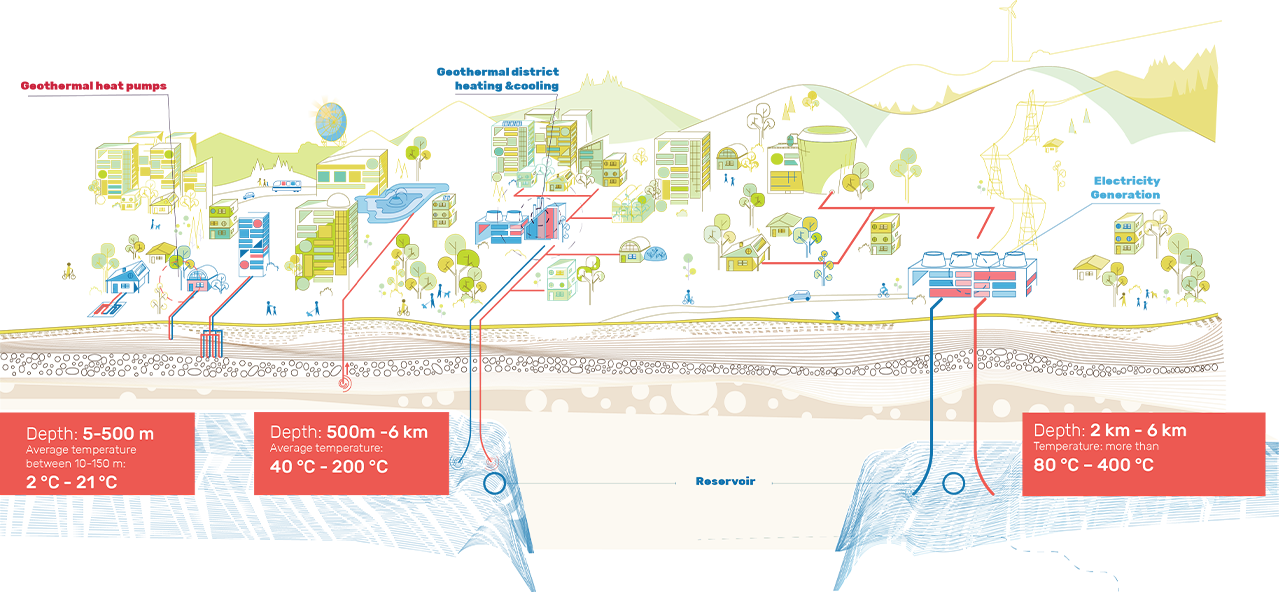The European Geothermal Energy Council (EGEC) is a not-for-profit organisation promoting all aspects of the geothermal industry. Founded in 1998, its objective is to facilitate awareness and expansion of geothermal applications across Europe by shaping policy, improving investment conditions and steering research.
It has over 200 members from 30 countries, ranging from developers to equipment manufacturers, energy providers, national associations, consultants, research centres, geological surveys, government agencies, departments and public authorities. This allows EGEC to represent the entire geothermal sector.
EGEC is listed in the European Transparency Register No. 11458103335-07
PRESIDENT
---GPC IP, FRANCE
VICE-PRESIDENT
---TURBODEN, ITALY
VICE- PRESIDENT
---KAMILA IZABELLA PIOTROWSKA, BAKER HUGHES
ORDINARY MEMBER
---GEOENERGIE KONZEPT GMBH
ORDINARY MEMBER
---FRAUNHOFER IEG, GERMANY
ORDINARY MEMBER
---GEOPLAT & UNIVERSIDAD POLITECNICA DE VALENCIA, SPAIN
ORDINARY MEMBER
---CROATIAN HYDROCARBON AGENCY, CROATIA
ORDINARY MEMBER
---ENEL, ITALY
ORDINARY MEMBER
---GEOTHERMAL EXPRESS LTD, HUNGARY

Geothermal heat pumps provide the most efficient and cheapest energy in Europe, because they operate using constant underground temperature.
A geothermal heat pump turns the heat under the surface of the earth into heating, cooling and hot water for use in any kind and size of buildings, from homes to offices, schools, swimming-pools, shopping centres and public buildings.
The whole system is very simple and can be installed almost anywhere throughout Europe. The installation of boreholes allows the exchange of geothermal energy between the ground and the building (simply by circulating groundwater or a brine through pipes).
A geothermal district heating and cooling system meets the energy demands of buildings and industrial users alike. It can be tailored to suit different needs: residential buildings, greenhouses, industries, offices, and countless others.
In a large geothermal heating system, geothermal energy comes from an underground reservoir of water and hot rocks and is transported through a distribution network into buildings or processed by industries.
Drilling at a depth of 1 to 3 km is potentially enough to install geothermal heating networks everywhere in Europe. Today many European cities - such as Paris, Munich, Milan, Southampton - are powered by this system.
In the future, geothermal district heating networks could provide energy for 25% of the European population.
A geothermal power plant has a capacity ranging from 1 to 40 Mwe to produce baseload electricity. It is available 24 hours a day, every day of the year, to match consumer demand while providing grid stability.
Geothermal power plants require high temperatures in deep reservoirs to produce electricity. But temperature and depth can vary widely according to the different regions and the characteristics of the site.
Geothermal energy comes from wells drilled into the earth to reach a reservoir. Steam or hot water are piped to the surface to power a turbine that generates electricity.
Geothermal energy is the heat stored beneath the Earth’s surface. It is an endless source of renewable energy, which can be used for heating, cooling, electricity and energy storage for countless uses in buildings, industry and agriculture
Membership of EGEC is open to private and public bodies operating in the geothermal sector provided that they are located or have operations within Europe. Membership fees are based on size, turnover, and scope of the body requesting association.
Apply for membership by completing the online application below. Applications are subject to decision by the EGEC board. For more information contact the Secretariat at com@egec.org
